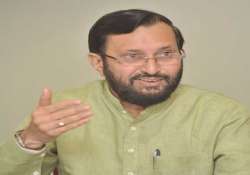Don't blame us for carbon emissions: India
New Delhi: Sending out a signal to the developed world on the issue of climate change, India today said developing countries like it have “a right to grow” and in the process “our net emission

New Delhi: Sending out a signal to the developed world on the issue of climate change, India today said developing countries like it have “a right to grow” and in the process “our net emission may increase.”
Environment Minister Prakash Javadekar underlined that the problem of carbon emission has not been created by the developing nations and hence responsibility for addressing it should not be solely put on them.
“We have to reduce our carbon emissions. But I have not created the carbon emisssion problems, which have been done by others. But I am not into any blame game. The issue is that I have a right to grow. India and developing countries have right to grow. These are the emerging economies,” the Minister said while addressing a function here.
His statement assumes significance in the light of a meeting of ‘governments, leaders from finance, business, local government and civil society' in New York in September this year to “bring bold and new announcements and action” to keep the earth below the globally agreed two degree temperature rise.
Noting that poverty is an “environmental disaster”, Javadekar said “unless we tackle poverty, unless we eradicate poverty, we cannot really address the climate change.”
“To that end, we need to grow. Our net emission may increase,” he said while speaking as the chief guest on the occasion of “World Day to Combat Desertification” organised by the Environment Ministry and Indian Council for Forestry Research and Education.
The statement is expected to further strengthen the BASIC group of nations on climate—a bloc of four biggest emerging countries - Brazil, South Africa, India and China - formed in November 2009.
The new government's announcement came amid criticism that developing countries have lost out on all the key areas of UN climate change negotiations at Warsaw last year.
After the Warsaw Conference, Green NGOs and civil society groups had alleged that the developed nations managed to shift the burden of reducing emissions on to the emerging economies like India and China.
Warsaw had also witnessed developed countries like Australia reneging on their emissions reduction commitments made under the Cancun Agreement and their promise of delivering USD 100 billion Green Climate Fund per year by 2020 remains a distant dream.
Recognising the importance of global warming, Modi government has given a new nomenclature to the Environment and Forests Ministry—the Ministry of Environment, Forests and Climate Change.
Environment Minister Prakash Javadekar underlined that the problem of carbon emission has not been created by the developing nations and hence responsibility for addressing it should not be solely put on them.
“We have to reduce our carbon emissions. But I have not created the carbon emisssion problems, which have been done by others. But I am not into any blame game. The issue is that I have a right to grow. India and developing countries have right to grow. These are the emerging economies,” the Minister said while addressing a function here.
His statement assumes significance in the light of a meeting of ‘governments, leaders from finance, business, local government and civil society' in New York in September this year to “bring bold and new announcements and action” to keep the earth below the globally agreed two degree temperature rise.
Noting that poverty is an “environmental disaster”, Javadekar said “unless we tackle poverty, unless we eradicate poverty, we cannot really address the climate change.”
“To that end, we need to grow. Our net emission may increase,” he said while speaking as the chief guest on the occasion of “World Day to Combat Desertification” organised by the Environment Ministry and Indian Council for Forestry Research and Education.
The statement is expected to further strengthen the BASIC group of nations on climate—a bloc of four biggest emerging countries - Brazil, South Africa, India and China - formed in November 2009.
The new government's announcement came amid criticism that developing countries have lost out on all the key areas of UN climate change negotiations at Warsaw last year.
After the Warsaw Conference, Green NGOs and civil society groups had alleged that the developed nations managed to shift the burden of reducing emissions on to the emerging economies like India and China.
Warsaw had also witnessed developed countries like Australia reneging on their emissions reduction commitments made under the Cancun Agreement and their promise of delivering USD 100 billion Green Climate Fund per year by 2020 remains a distant dream.
Recognising the importance of global warming, Modi government has given a new nomenclature to the Environment and Forests Ministry—the Ministry of Environment, Forests and Climate Change.